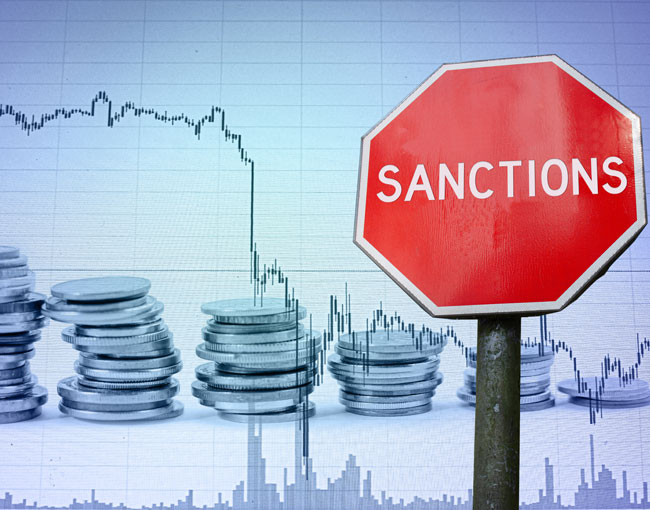National Bank of Georgia Decision
An attempt to circumvent international sanctions?

On September 14, 2023, the United States of America imposed sanctions on Otar Partskhaladze, the former Prosecutor General of Georgia, a figure of questionable reputation. These sanctions were part of a broader package imposed on the Russian Federation in response to the ongoing conflict in Ukraine. The official statement indicated that Partskhaladze was a Georgian-Russian oligarch who had allegedly acted upon the directives of FSB operative Oleksey Onishchenko. The statement further asserted that Onishchenko and the FSB had utilized Partskhaladze as a tool to influence Georgian society and politics.
Following the sanctions, access to Partskhaladze's bank accounts was restricted on September 18. Subsequently, on the same day, the National Bank of Georgia declared its intention to align with the sanctions imposed by the United States, the European Union, and Great Britain against the Russian Federation, effective since February 26, 2022. Additionally, under the guidance of the National Bank of Georgia, a directive titled "Rule of Execution of Sanctions Regimes by Accountable Persons under the Supervision of the National Bank of Georgia," as per Presidential Order No. 208/04 dated August 4, 2023, was approved. This directive placed responsibility on Otar Partskhaladze for asset access and financial transaction execution.
Initially, members of the Georgian government disavowed any connections to Otar Partskhaladze. However, after the National Bank took a decisive stance, Irakli Kobakhidze, the leader of the ruling Georgian Dream party, declared on national television that the National Bank's actions were unconstitutional. Consequently, on the evening of September 19, Natia Turnava, the Acting President of the National Bank, unilaterally issued an amendment to the aforementioned directive. This amendment required commercial banks to adhere to the sanctions against Georgian citizens solely if a legally binding guilty verdict from a Georgian court served as the basis for the sanctions.
On the morning of September 20, the commercial banks of Georgia reaffirmed their commitment to the sanctions. Regrettably, in response to Natia Turnava's decision, all three vice presidents of the National Bank of Georgia—Papuna Lezhava, Archil Mestvirishvili, and Nikoloz Gagua—resigned from their positions. Giorgi Bakradze, an adviser to the President of the National Bank, also tendered his resignation. With nine seats in the Board of the National Bank, and three members dismissed, only four members remained, rendering the National Bank of Georgia nonfunctional. Consequently, on September 21, the Georgian Parliament convened in the morning and approved two new members, whose qualifications and reputations were met with skepticism but who displayed unwavering loyalty to the Georgian Dream party, thus filling the vacant seats.
Natia Turnava's unilateral decision was perceived as a capitulation to pressure from the ruling party, effectively eroding the independence of the National Bank, which now aligns itself with the Georgian Dream party's interests. This represents a significant setback for the National Bank of Georgia, and its recovery from this loss of independence will be an arduous endeavor. The Georgian Dream party, through Irakli Kobakhidze's declaration, had previously indicated their disapproval of the National Bank's independence and their intent to curtail it. Unfortunately, their objectives have been achieved.
The relinquishment of the National Bank's independence carries severe repercussions for the Georgian economy. While the immediate consequences may not lead to a financial collapse overnight, the gradual impact will be felt across various sectors. Historically, the National Bank of Georgia has served as Georgia's representative in its interactions with the International Monetary Fund (IMF) and has maintained a positive reputation until now. However, the institution's credibility has been significantly compromised, and the IMF will undoubtedly reevaluate its future engagement with Georgia.
Already, the American government and the IMF have voiced stern assessments, signaling that concrete actions may follow soon. As commercial banks did not heed Natia Turnava's directive, the financial sector of Georgia is not currently under the immediate threat of sanctions. However, the situation remains fluid, and circumstances may evolve.
Regarding the order issued by the Acting President of the National Bank, on Otar Partskhaladze, it may soon become irrelevant as there are indications that he could lose his Georgian citizenship. Nevertheless, the order could serve as a precedent for potential sanctions against other Georgian citizens in the future.
Regarding the order issued by the Acting President of the National Bank, initially, it appeared that Otar Partskhaladze would forfeit his Georgian citizenship, as per the stipulations of Georgian legislation. However, on September 22, the President of Georgia rendered a somewhat legally ambiguous decision, allowing Otar Partskhaladze to retain his Georgian citizenship. Consequently, despite the unequivocal stance adopted by Georgian commercial banks, Natia Turnava's order still affords Otar Partskhaladze a potential avenue to circumvent the sanctions. Furthermore, it's worth noting that Otar Partskhaladze is not the sole Georgian-Russian oligarch within our borders, and the aforementioned decision could be applied to other Georgian citizens if they were to face sanctions in the future.
The reputation of the National Bank of Georgia has already been severely tarnished, and the unfolding developments are now eroding the international standing of this country. These repercussions have far-reaching effects, impacting both the economic and democratic progress of Georgia.
Ioseb Berikashvili
Dean
Caucasus School of Economics
